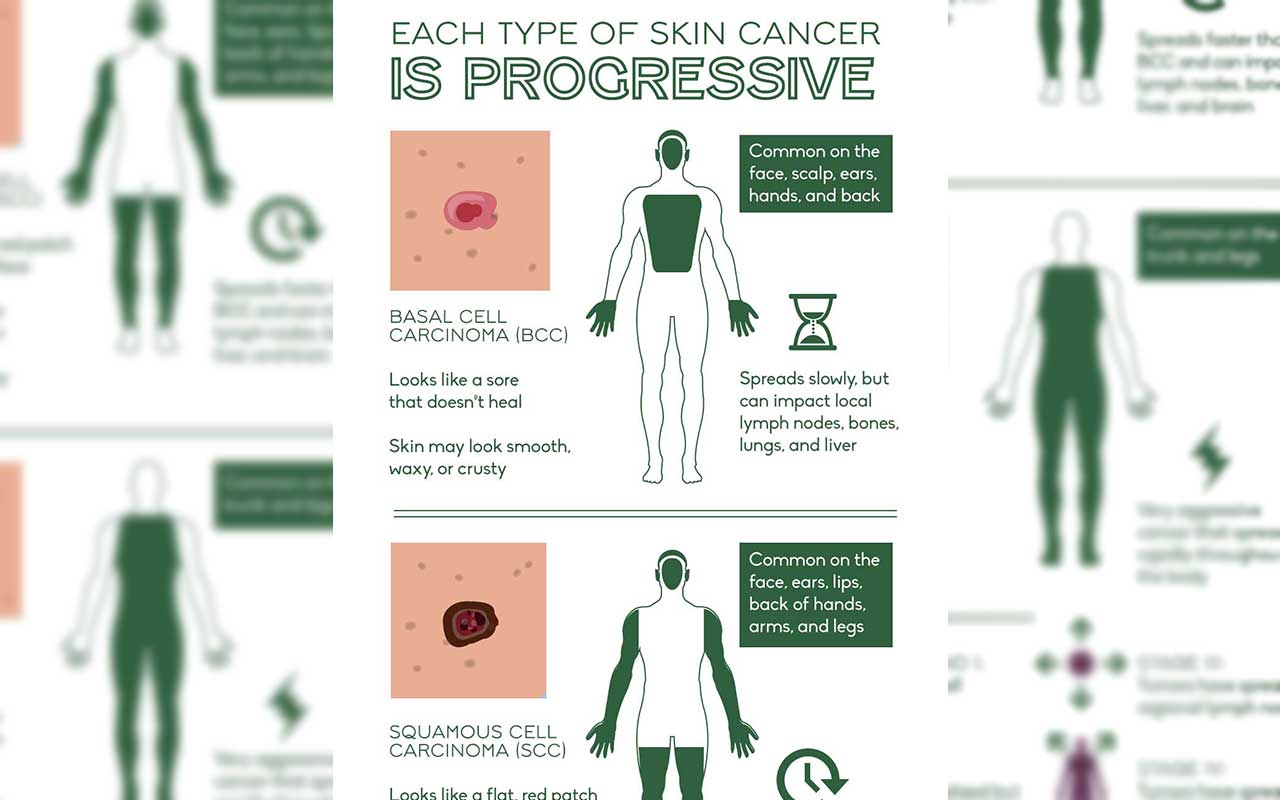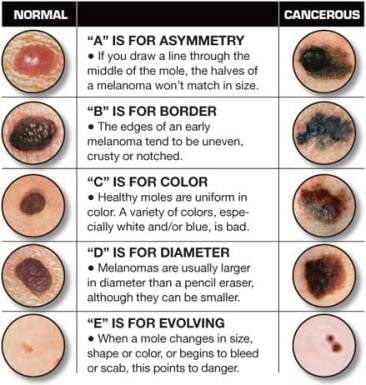
Can you honestly tell to yourself — “Do I know what skin cancer?
Am I safe from it?
Can I avoid it?
What to do, if I was diagnosed with it?
How can I protect myself from melanoma?
How to detect skin cancer?
Here is some info to avoid these questions.
Fact, skin cancer is a fatal illness, every year, thousands of young people and older people die from it. So the main questions people asking are:
- What types of skin cancer do you have?
- What are the first symptoms of this disease and what kind of treatment should I use?
- How to avoid skin cancer?
Articles you might like:
- Health Screening by Age.
- How to Reduce Your Risk of Breast Cancer.
- How Gut Bacteria Affects The Brain And Body. [infographic]
How to Detect Skin Cancer

Emerging birthmarks — a sign of skin cancer?
It is common to believe that skin cancer develops from already existing, congenital birthmarks.
Melanoma is not just a malignant process that occurs in the skin and spreads: The sun does not always affect melanoma.
Melanoma may develop in areas of the body that you almost never expose to the sun, such as the internal organs, the nasal cavity, the pharynx, the stomach, the intestines/gut…
It can be thought that cancer occurs only from excessive sunshine and with certain birthmarks defects. So question “How to detect skin cancer” stays unanswered.
However, skin cancer is a much more complicated disease. According to the origin of the medicine, skin cancer is divided into three main types:
- It is basaloma (basal cell carcinoma)
- Platelet cancer
- Melanoma
It is especially important to determine the latter species as early as possible, although melanoma cases account for 5% of all skin tumors. Alos it is considered to be the most aggressive type of skin cancer. Mortality from melanoma is as high as 71%.
Articles you might like:
- Full Guide Of Psoriasis. Discover The Recent Treatments And Tips Of this Disease.
- What Triggers Rosacea? How To Fight Symptoms and Treat This Disease.
Types of Skin Cancer
Basaloma
Basaloma is the most common form of skin cancer, accounting for approximately 70-80% of all malignant skin tumors. It is the disease of the elderly (on average 55 years old), which is mostly affected by UV rays.
Other factors for basaloma.
- Scars;
- Tattoos;
- Carbon dust;
- Asbestos exposure, etc.
Basaloma a common, but almost always curable disease (in about 99% of cases), since the tumor grows very slowly, cancerous cells rarely spread to surrounding structures.
Symptoms of the eye are unusual irregular forms of scabs, redness, red or dark skin derivatives. Basaloma can occur anywhere in the skin.
Squamous Cell Carcinoma
Squamous Cell Carcinoma (Flat-cell skin cancer) occurs less frequently than basal (9-19% of skin tumors) and is common in older people (on average, 65 years). The appearance of UV radiation and carcinogens is greatest. Eye-catching symptoms are similar to unusual, often bleeding skin derivatives.
What is Melanoma
One of the most important causes of skin cancer is the weakening of the immune system. Melanoma — the most dangerous form of skin cancer.
Like other oncological diseases, melanoma is a disease in the entire body, the development of which is associated with immune system disorders.
The most common melanomas are black or brown, but sometimes there are exceptions — unpigmented melanomas, which may be pink, brownish or even white.
So How To Avoid Skin Cancer?
It would be wrong to say that a person is capable of preventing all possible skin cancer cases: some of them are simply encoded in our individual genetic assemblies.
However, we can reduce the risk of skin cancer or stop its spread. Here is a set of actions that can help save your skin from this dangerous disease.
UV rays. Beware of harmful UV rays. Solarium, sunbathing on the beach poses a risk to skin health. Protective creams with a UV filter can protect against cancer, but not one hundred percent. Skin cancer agents that need to be avoided:
- carcinogenic substances (found in, for example, tobacco smoke);
- intense radiation;
- asbestos;
- cosmetic parabens;
- high preservatives in the diet, etc.
Birthmarks/moles
Before answering the question How to detect skin cancer, we need to determine bad moles. Birthmarks/moles that are very large or constantly rubbing the clothes. Be careful not to harm, mumble, observe the changes of birthmarks, and prophylactically check with your doctors.
It is important to remember that the frustrating pace of life, stress, and stress can also spur cancer.
Badly supervised organism weakened immune system makes it easier for any diseases, including skin cancer. So healthy, happy and enjoyable life is another way of preventing oncological diseases.
